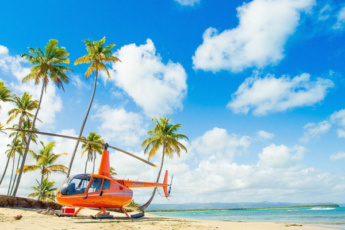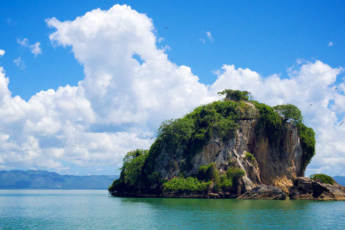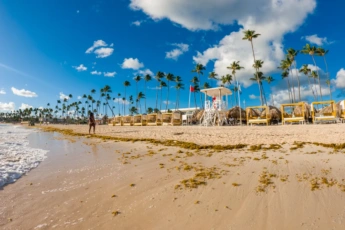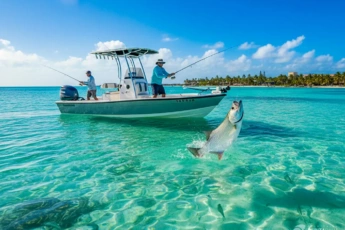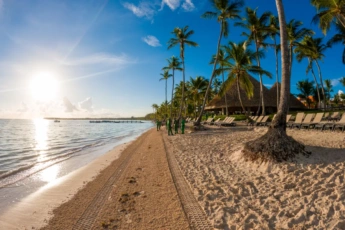Dominican Republic in January 2026 – Weather, Best Places to Stay & Top Activities
The Dominican Republic in January is the perfect choice for those looking to escape the winter cold and immerse themselves in the atmosphere of a tropical paradise. With warm sunny days, clean beaches and a rich cultural heritage, the country is becoming one of the best places for a winter vacation. From luxury villas in Punta Cana to exciting excursions to national parks and historic cities, the Dominican Republic has something for everyone.
In this article, we’ll look at why January is one of the best months to travel to the country, talk about weather conditions, accommodation options, popular activities and give useful tips for tourists.

Punta Cana beach view in January, the Dominican Republic
Weather in the Dominican Republic in January
January marks the beginning of the year with some of the best weather conditions for visiting the Dominican Republic. It is part of the dry season, making it a popular month for tourists seeking a tropical escape. The overall climate is characterized by warm temperatures, sunny skies, and relatively low humidity. Here’s a detailed breakdown of what you can expect from the weather in January across various regions:
General climate overview
The Dominican Republic has a tropical climate, and January offers cooler temperatures than summer’s warmer, humid months. Across the country, temperatures typically range between:
- Daytime temperatures: 25°C to 28°C (77°F to 82°F)
- Nighttime temperatures: 18°C to 22°C (64°F to 72°F)
While most of the country experiences warm, pleasant days, nights can be more relaxed, especially in mountainous regions such as Constanza and Jarabacoa. This comfortable climate makes it an excellent time for beach lounging, sightseeing, and outdoor adventures.
Weather by region
The weather in the Dominican Republic can vary slightly depending on the region. Here is an overview of what to expect in some of the country’s popular destinations:
Weather conditions in different regions in the Dominican Republic
| Region | Average daytime temperature (°C) | Rainfall (mm) | Description |
|---|---|---|---|
| Punta Cana | 27°C – 29°C | ~60 mm | Punta Cana experiences sunny, warm weather, making it perfect for beachgoers. Rainfall is minimal, with short showers. |
| Santo Domingo | 26°C – 28°C | ~70 mm | The capital city offers warm days and mild evenings. Rainfall is generally light and short-lived. |
| Puerto Plata | 25°C – 27°C | ~80 mm | This northern region may see slightly more rainfall but remains warm with plenty of sun. |
| Samaná | 25°C – 27°C | ~85 mm | The Samaná Peninsula sees lush vegetation thanks to occasional rain, but sunny weather prevails most days. |
| Jarabacoa | 20°C – 24°C | ~50 mm | Located in the mountains, Jarabacoa enjoys cooler temperatures, making it ideal for hiking and eco-tourism. |
Sunlight and daylight hours
In January, the Dominican Republic enjoys approximately 9-10 hours of daylight per day. Sunrises are usually around 6:30 AM, and sunsets occur close to 6:00 PM. This generous amount of sunlight makes it easy to maximize your time exploring beaches, parks, and cultural sites.
Rainfall and humidity levels
January falls within the dry season, which runs from November to April. This period is marked by reduced rainfall and relatively low humidity, offering ideal conditions for outdoor activities.
While brief showers can occur, they are typically short-lived and often occur in the late afternoon or early evening. These showers tend to refresh the air without significantly disrupting plans.
Sea conditions and swimming
The sea temperatures around the Dominican Republic remain warm and inviting, averaging between 26°C and 28°C (79°F to 82°F) in January. This makes it an excellent month for water activities such as swimming, snorkeling, diving, and windsurfing. Coastal waters are generally calm, with clear visibility for marine adventures.
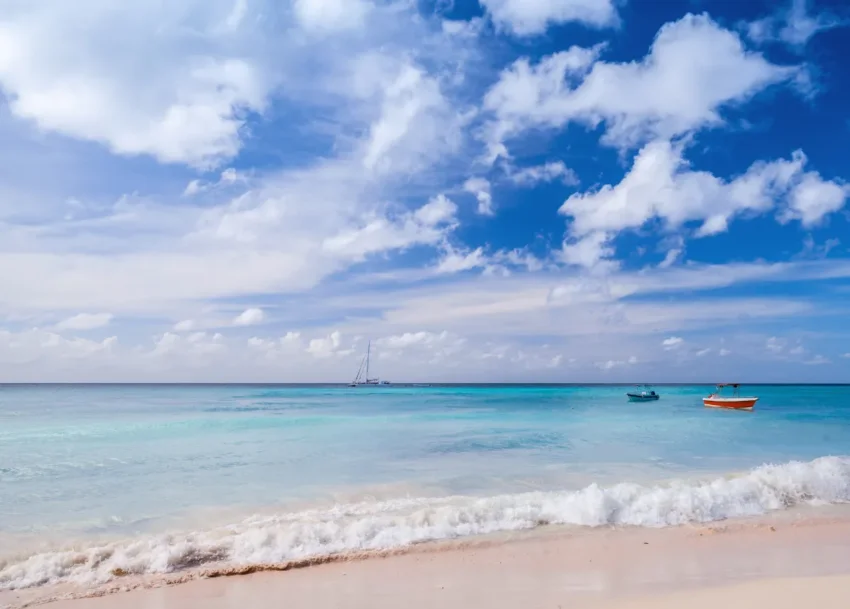
Sea view on the Isla Saona, the Dominican Republic
Ideal conditions for activities
The pleasant weather conditions in January make it a great time for various activities, including:
- Beach and sunbathing. Ideal for lounging on Punta Cana’s white sandy beaches.
- Outdoor adventures. Hiking in regions like Jarabacoa or exploring national parks.
- Whale watching. January marks the start of the whale-watching season in Samaná Bay, where humpback whales migrate for breeding and birthing.
-
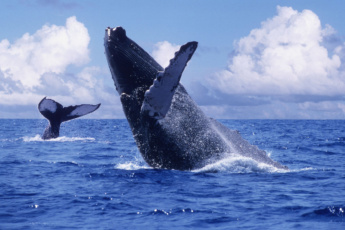
The Best Samaná Whale Watching Tour 2026 – Humpback Whales, Cayo Levantado, El Limon Waterfall
from $149 View Details -
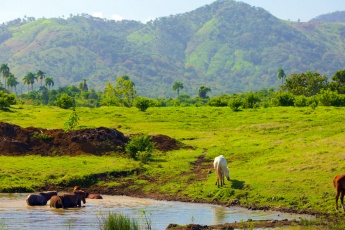
Higüey Cultural & Countryside Private Tour – Basilica of Altagracia, Anamuya River, Macao Beach, Horse Ride & Taino Cave
from $120 View Details -
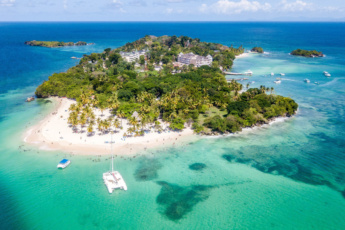
Cayo Levantado (Bacardi Island) and El Limon Waterfall Tour – Samana’s Best 2-in-1 Tour 2026
from $145 View Details -
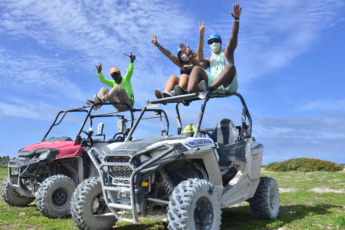
Bávaro Adventure Park Best Combo Tour 2026 – Catamaran, Polaris, Blue Lagoon, Dominican Village & Bonus Activity
from $209 View Details -
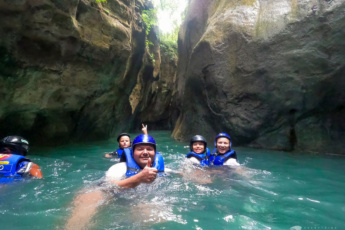
Damajagua Falls (27 Charcos) and Puerto Plata Cable Car Tour – Private Full Day from Punta Cana
from $829 View Details -
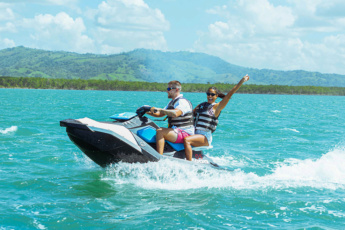
Jet Skiing Punta Cana – Best Jet Ski Tour in the Dominican Republic – Cayo la Bocaina
from $193 View Details -
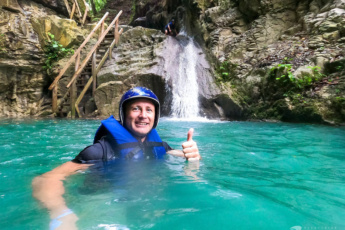
27 Waterfalls of Damajagua & Rafting on Yaque del Norte River in Jarabacoa – Private Full Day Tour from Punta Cana
from $699 View Details -
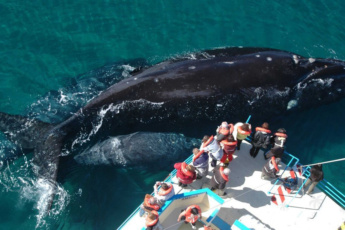
Private Whale Watching Tour from Punta Cana – Samaná Humpback Whales, Bacardi Island, El Limon Waterfall
from $2400 View Details -
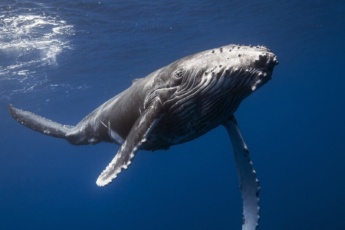
Private Samana Whale Watching Tour from Punta Cana – Humpback Whales & Cayo Levantado
from $2140 View Details -
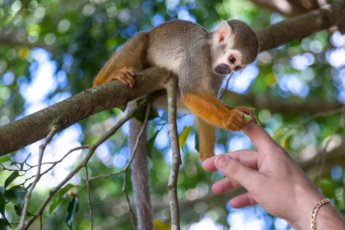
Best Monkey Excursion from Punta Cana – 2-in-1 Tour: Monkeyland and the Longest Zip Line in the DR
from $130 View Details
Weather tips for January travelers
To make the most of your trip to the Dominican Republic in January, here are detailed weather tips that will ensure you stay comfortable, prepared, and safe throughout your stay.
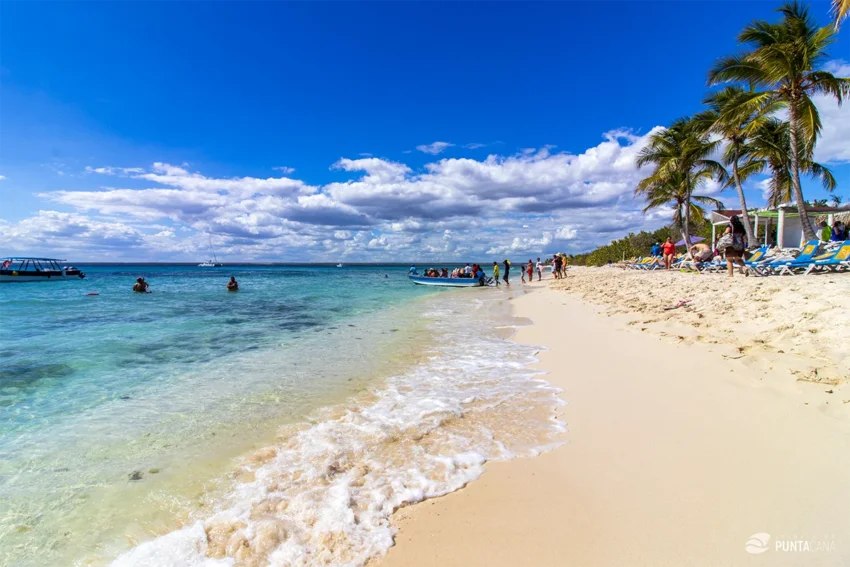
Catalina Island view, the Dominican Republic
Pack for warm days and cool nightsDaytime temperatures reach 27-30°C (81-86°F) in most areas, cooling to around 20-23°C (68-73°F) at night. Lightweight clothing, swimwear for the beach, and a light jacket or long-sleeve top for evenings will help you stay comfortable.
Sun protection is a mustThe January sun is some kind of intense, so use a broad-spectrum sunscreen with SPF50 and do not forget to renew it every 4-5 hours, wear a hat, and protect your eyes with sunglasses. Stay hydrated, especially during peak sun hours.
Prepare for possible rain showersWhile January is typically dry, short rain showers are still possible. Bring a travel umbrella or light rain jacket. Opt for quick-dry clothing to stay comfortable after any unexpected rain.
Stay comfortable in the eveningsInsect repellent is recommended for evening outings, and long-sleeved shirts and pants can offer extra protection against mosquitoes while keeping you warm.
Plan for water-based activitiesEnjoy warm sea temperatures averaging 26-28°C (79-82°F). Pack swimwear, water shoes, and, if available, snorkeling gear. Don't forget water-resistant sunscreen wit SPF50 to protect against strong UV rays.
Be ready for mountainous adventuresIf exploring cooler regions like Constanza or Jarabacoa, layer clothing to adapt to changing temperatures. A lightweight daypack for essentials such as water, snacks, and rain gear is highly useful.
Be mindful of windy beachesJanuary can bring breezy conditions, especially on coastal areas. A windbreaker or beach cover-up is recommended for comfort during activities like kiteboarding or windsurfing.
Travel insurance considerationAlthough weather-related risks are minimal in January, comprehensive travel insurance can help cover unexpected incidents during outdoor or water activities.
January’s weather in the Dominican Republic is one of its strongest draws for tourists, offering warm days, cool evenings, and plenty of sunshine. It is perfect for enjoying all the beauty and activities the country has to offer without the heat and humidity of summer months or the storm risks of hurricane season.
Best Places to Stay in the DR
in January
The Dominican Republic offers various accommodation options to suit all tastes and budgets. From luxurious beachfront villas, apartments, and all-inclusive resorts to charming boutique hotels and cozy guesthouses, January is the perfect time to enjoy these top choices. This chapter highlights some of the most recommended locations for staying in the Dominican Republic, focusing on popular destinations such as Punta Cana, Casa de Campo, La Romana, Jarabacoa, and Samaná.
Punta Cana – the ultimate beach destination
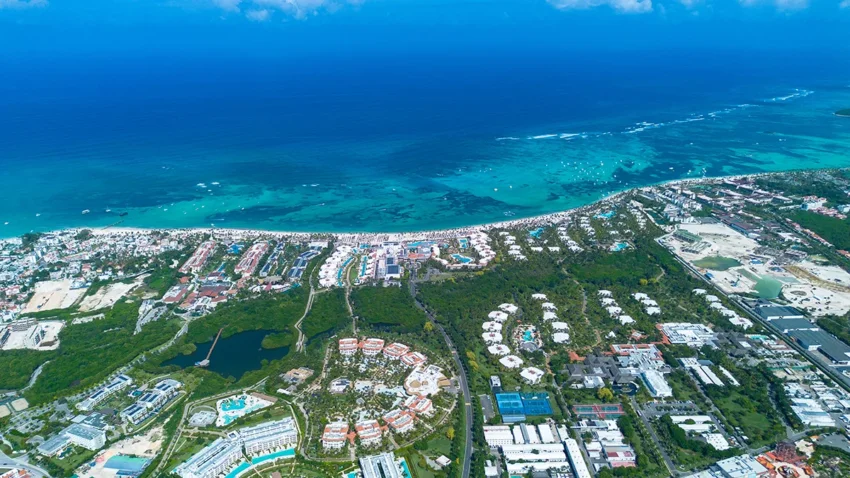
Punta Cana from Drone view
Punta Cana is one of the Dominican Republic’s most sought-after destinations, known for its pristine beaches, luxurious accommodations, and endless activities. Thanks to pleasant weather and calm seas, January is the perfect month to experience all that Punta Cana has to offer. Best accommodations include beachfront villas, apartments, condos, studios, penthouses and so on:
-
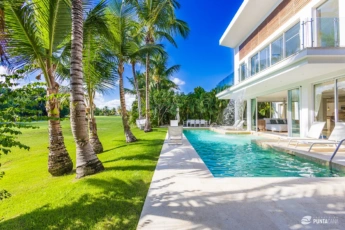
Luxury All Inclusive Villa Waterfall in Punta Cana (Bávaro, Cocotal) – Private Pool, BBQ, Maid, Chef & Meal Plans
from $1320 / night View Details -
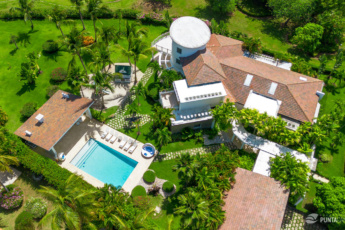
Villa Désirée – Luxury Golf Villa in Punta Cana’s Prestigious Cocotal Golf & Country Club – Huge Private Pool & BBQ Area, Kids’ Playground
from $1099 / night View Details -
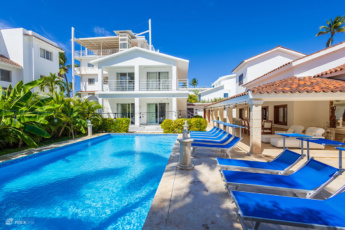
Villa May – New Modern Beachfront 7BR Villa with Pool & Maid in Bavaro, Los Corales
from $1299 / night View Details -
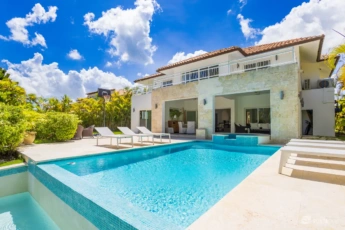
Spacious 4-BR Punta Cana Golf Villa in Cocotal – Private Pool, Jacuzzi & Basketball Hoop for Family Fun
from $649 / night View Details -
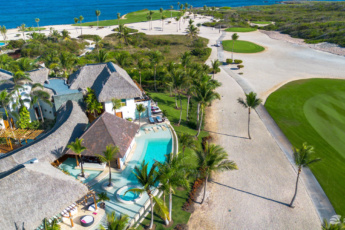
Villa Agapi (Caleton Estates 57) – The Most Beautiful Ocean View Villa in Cap Cana
from $2850 / night View Details -

Exclusive Ocean View 5-Star Cap Cana Villa for Rent – Chef, Butler, Maid & Golf Cart
from $4600 / night View Details
In Punta Cana, there are also highly recommended hotels and resorts, including:
- Hard Rock Hotel & Casino Punta Cana which features 9 restaurants, a golf course, and a large waterpark.
- Secrets Cap Cana Resort & Spa – an adults-only resort with a romantic ambiance, gourmet dining, and high service.
Casa de Campo – luxury and elegance in La Romana
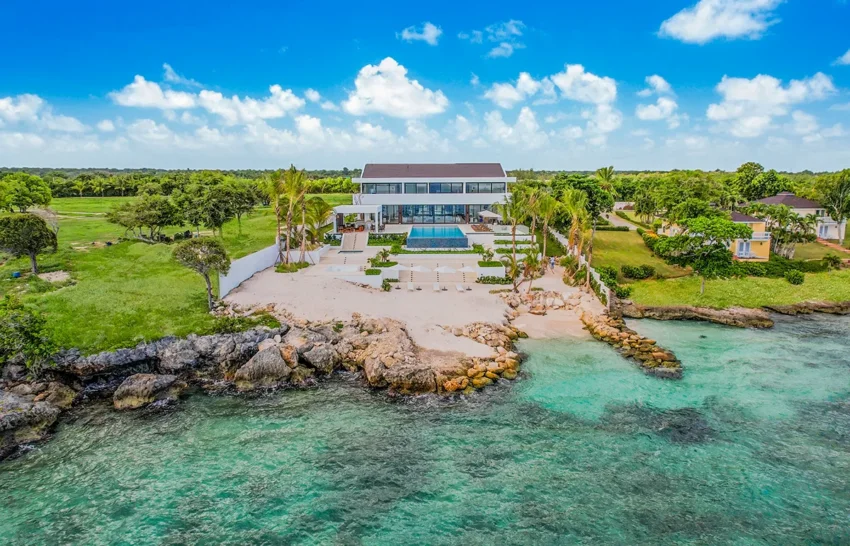
Casa de Campo Dream Villa
Located in La Romana, Casa de Campo is a prestigious resort complex famed for its luxury villas, world-class golf courses, and elite clientele. It offers a refined stay experience, blending comfort and exclusivity with plenty of recreational opportunities. Private Villas: Many travelers opt for private villas in this exclusive community. Villas offer elegant interiors, private pools, and access to resort amenities. Examples include:
-
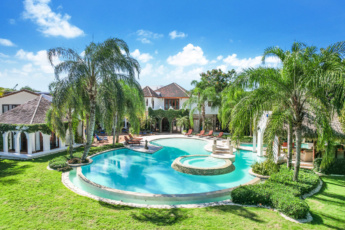
5-Star Villa for Rent in Moroccan-Style at Casa de Campo – Large Pool, Jacuzzi & Staff
from $4368 / night View Details -
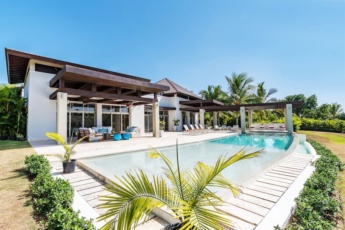
Casa de Campo Villa for Wedding or Private Events – With Huge Lawn, Pool, Jacuzzi, Golf Cart, Chef, Butler & Maid
from $3650 / night View Details -
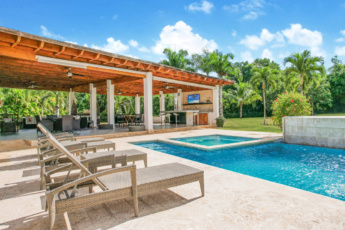
Luxurious 5-bdr Villa at Casa de Campo – With Pool, Jacuzzi, Games, Hibachi Grill, Staff
from $1685 / night View Details -
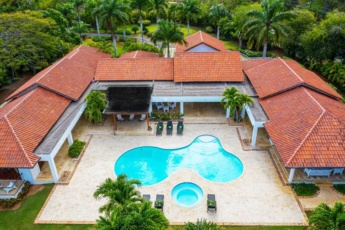
Casa de Campo Villa – Luxurious Property for Up to 12 People With Pool, Jacuzzi, BBQ & Golf
from $1747 / night View Details -

Cozy Private Family Villa at Casa de Campo – Pool, BBQ & Golf Cart
from $1560 / night View Details -
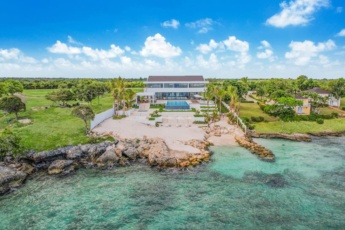
New & Luxury Casa de Campo Oceanfront Villa – With Private Beach, Large Pool, Top Amenities
from $14820 / night View Details
The main resort offers deluxe rooms, suites, and various on-site dining options. Staying here grants access to Dye Fore and Teeth of the Dog golf courses, ranked among the best in the Caribbean. Casa de Campo offers guests access to Minitas Beach, private yacht excursions, equestrian trails, and a vibrant marina area.
Samaná Peninsula – unspoiled natural beauty
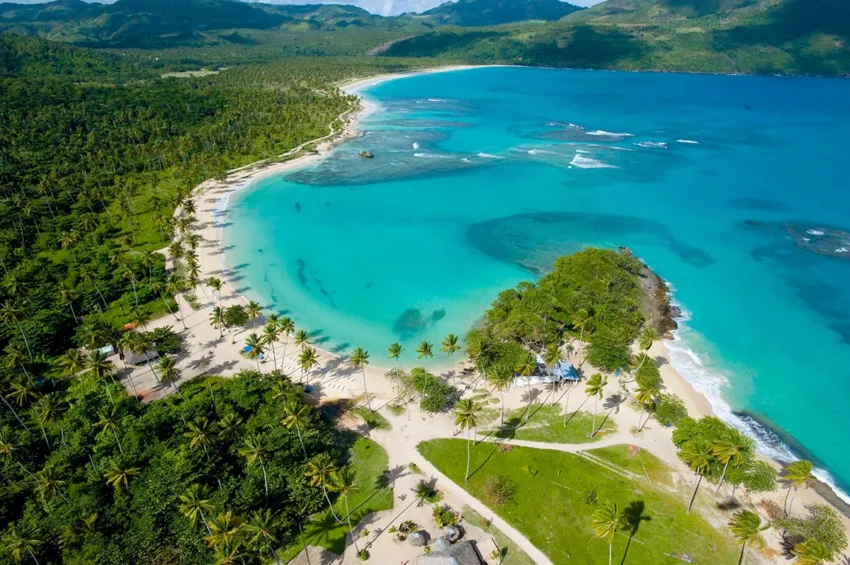
Playa Rincon, Samana
The Samaná Peninsula is a hidden gem known for its untouched beaches, lush landscapes, and unique whale-watching opportunities starting in January. It’s ideal for travelers looking to escape the crowds and immerse themselves in nature.
There are very popular eco-lodges, boutique hotels and other accommodations like:
- Samaná Ocean View Eco-Lodge that combines comfort with eco-friendly practices, offering panoramic views.
- Villa Serena Hotel is nestled in Las Galeras, which provides personalized service and access to stunning beaches.
- Beachfront apartments are perfect for travelers seeking proximity to the beach with a homely feel. Many of these apartments come with kitchen facilities and sea views, like those in Las Terrenas.
Samaná offers unique activities such as humpback whale-watching in Samaná Bay, exploring El Limón Waterfall, and visiting the Los Haitises National Park.
Cap Cana – exclusive and upscale living
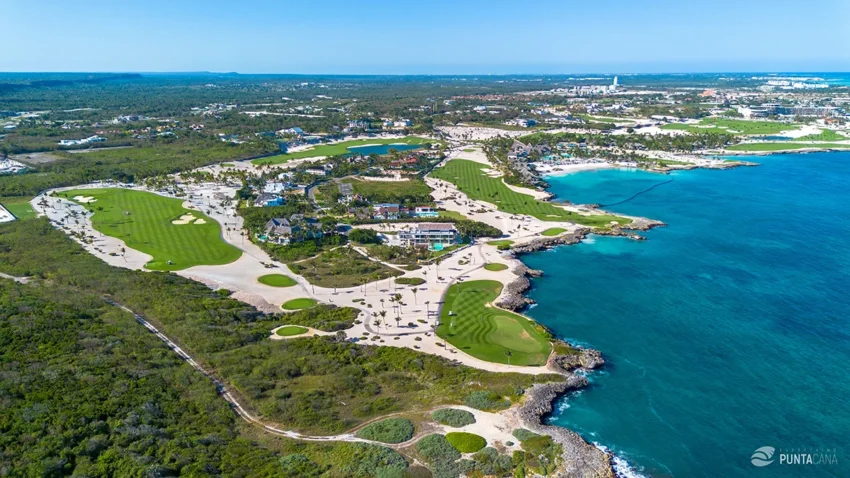
Cap Cana resort drove view
Located just south of Punta Cana, Cap Cana is an upscale resort community known for its luxurious accommodations and world-class marina. It’s perfect for those who want to experience premium hospitality and exclusivity. Cap Cana is well-known for its spacious layouts, infinity pools, and direct access to the beach. Some of the top-rated options include:
-

Villa Agapi (Caleton Estates 57) – The Most Beautiful Ocean View Villa in Cap Cana
from $2850 / night View Details -

Exclusive Ocean View 5-Star Cap Cana Villa for Rent – Chef, Butler, Maid & Golf Cart
from $4600 / night View Details -

Luxury Golf Villa at Cap Cana Resort in Punta Cana – Punta Espada, Juanillo and Api Beach Clubs
from $2646 / night View Details -
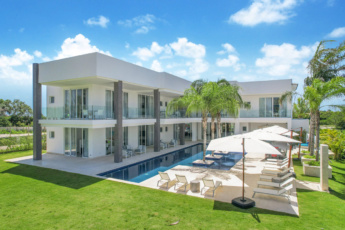
Huge Luxury Cap Cana (Las Palmas) Golf Villa for Rent – Chef, Butler, Maid, 2 Golf Carts, Jacuzzi, Semi-Olympic Pool
from $3744 / night View Details -

Brand-New Oceanfront Luxury Cap Cana 10BR Villa – Private Beach, Full Staff, Home Theater
from $8648 / night View Details -
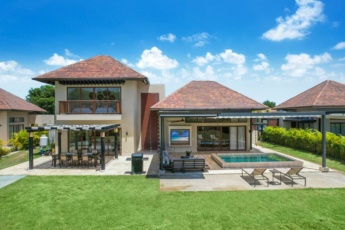
Stylish Newly Built 3-Bedroom Family Villa in Cap Cana (Punta Espada) – With Private Pool & Housekeeper
from $936 / night View Details
Highlights of staying here: guests can enjoy golfing at Punta Espada Golf Club, fine dining experiences, and adventurous water sports like kiteboarding, diving and sailing.
Jarabacoa – adventure and mountain retreats
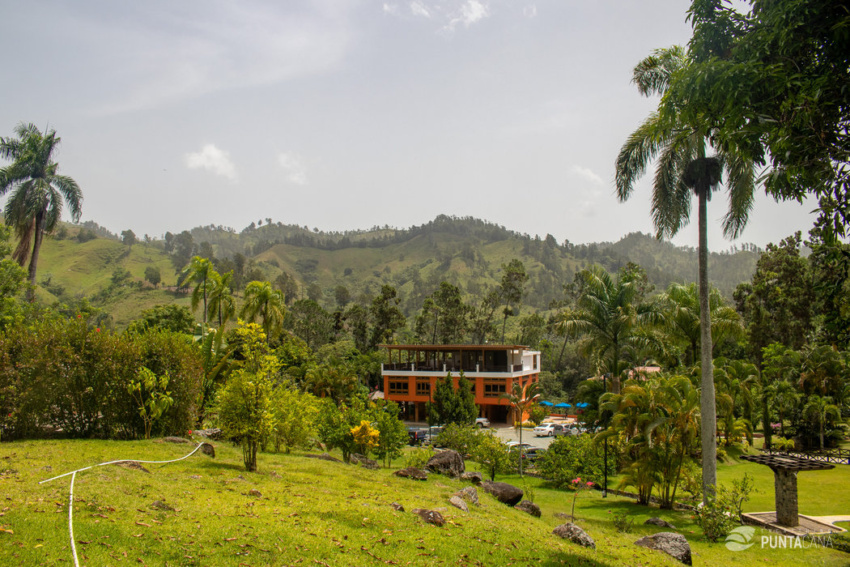
Jarabacoa
For travelers seeking an escape from the tropical beaches, Jarabacoa offers mountains, cool breezes, and endless outdoor adventures. Known as the “Dominican Alps,” it’s a paradise for adventure seekers. Top accommodation options in Jarabacoa include eco-lodges and mountain villas, Rancho Baiguate, hotel Gran Jimenoa next to the Jimenoa River:
-
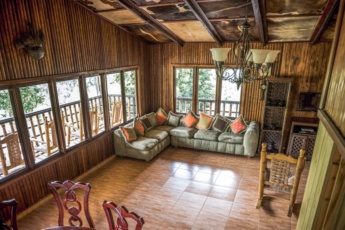 16 guests5 bedrooms8 beds6 baths
16 guests5 bedrooms8 beds6 bathsModern private villa with pools in guarded resort of Jarabacoa
from $483 / night View Details -
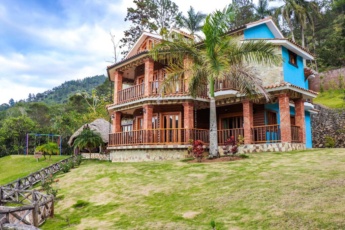 16 guests5 bedrooms8 beds6 baths
16 guests5 bedrooms8 beds6 bathsPrivate villa with pools in Jarabacoa resort
from $526 / night View Details -
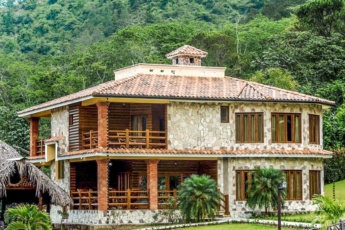 16 guests5 bedrooms8 beds6 baths
16 guests5 bedrooms8 beds6 bathsPrivate villa with pools in the gated complex of Jarabacoa
from $526 / night View Details -
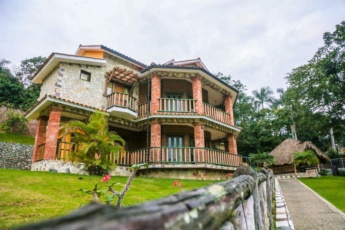 16 guests5 bedrooms8 beds6 baths
16 guests5 bedrooms8 beds6 bathsPrivate villa with pools in guarded resort of Jarabacoa
from $526 / night View Details -
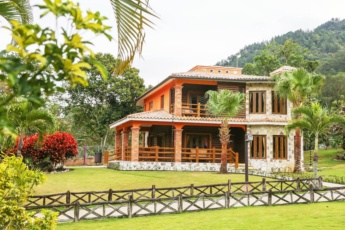 12 guests4 bedrooms6 beds5 baths
12 guests4 bedrooms6 beds5 bathsLuxury villa with pool in Jarabacoa
from $417 / night View Details -
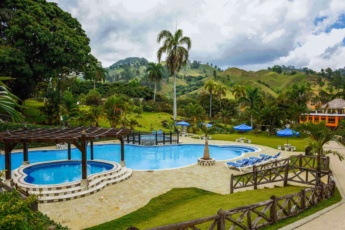 4 guestsStudio1 bed1 bath
4 guestsStudio1 bed1 bathCozy small apartment in the gated complex of Jarabacoa
from $290 / night View Details
Visitors can enjoy white-water rafting on the Yaque del Norte River, hiking to Pico Duarte (the highest peak in the Caribbean), or exploring hidden waterfalls. Paragliding over the scenic valley offers a unique adrenaline rush.
Tours and Activities to Enjoy in January
in the Dominican Republic
The Dominican Republic’s stunning landscapes, vibrant culture, and diverse ecosystems make it a prime destination for a variety of activities and tours. January, with its pleasant weather and cool breezes, offers the perfect conditions to explore everything from tropical jungles and historic sites to underwater adventures. Here’s a detailed look at some of the best experiences to enjoy in January across the country.
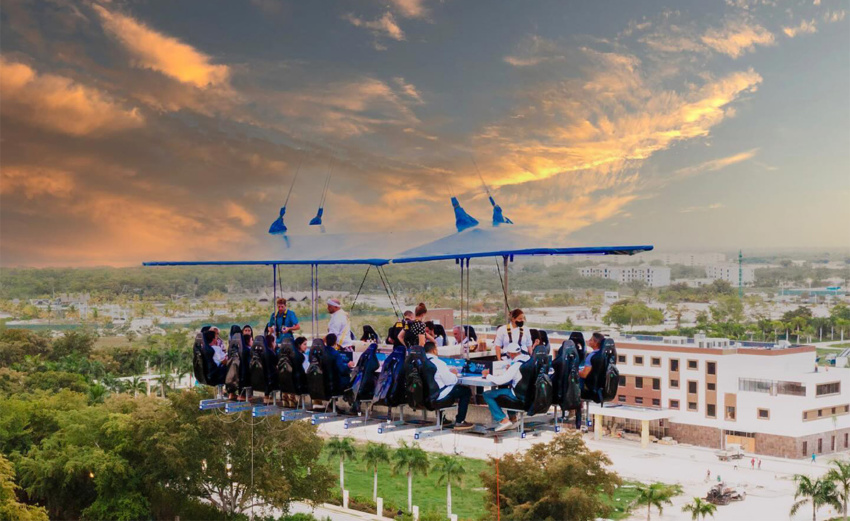
Dinner in the sky in Punta Cana
Whale watching in Samaná Bay
One of the most unique experiences in the Dominican Republic in January is the annual migration of humpback whales to Samaná Bay. Each year, these majestic creatures make their way to the warm waters around the peninsula for mating and giving birth, offering a spectacular show for visitors.
-

The Best Samaná Whale Watching Tour 2026 – Humpback Whales, Cayo Levantado, El Limon Waterfall
from $149 View Details -

Private Whale Watching Tour from Punta Cana – Samaná Humpback Whales, Bacardi Island, El Limon Waterfall
from $2400 View Details -

Private Samana Whale Watching Tour from Punta Cana – Humpback Whales & Cayo Levantado
from $2140 View Details
Catamaran and snorkeling tours in Punta Cana
January’s mild seas and sunny weather are ideal for catamaran cruises in Punta Cana. These tours combine relaxation and adventure as you sail along the stunning coastlines, snorkel in crystal-clear waters, and enjoy lively onboard parties.
- Saona Island and Catalina Island are popular destinations, known for their pristine beaches and colorful coral reefs.
- Try snorkeling experience! Swim alongside vibrant tropical fish, sea turtles, and, occasionally, rays.
-
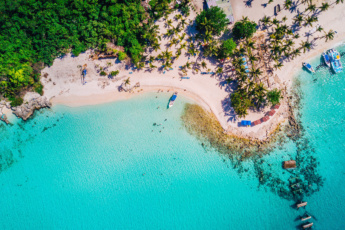
Saona Island Private Tour – From Punta Cana to Saona Excursion
from $1040 View Details -
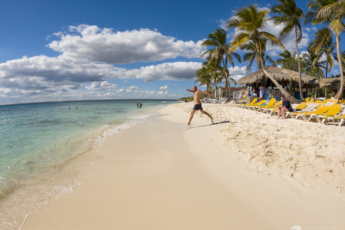
Private Catalina Island Full-Day Tour by Speedboat – Snorkeling, Personal Guide
from $850 View Details -
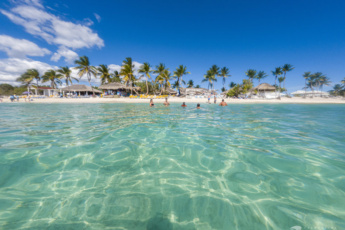
Catalina Island Day Trip: the Best Snorkeling Experience
from $85 View Details -
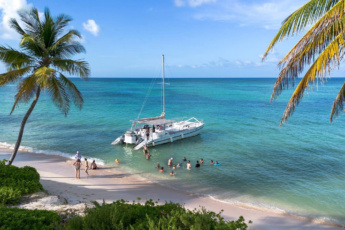
Catamaran Tour in Punta Cana (Bavaro) – Party, Sailing & Snorkelling Experience 2026
from $75 View Details -
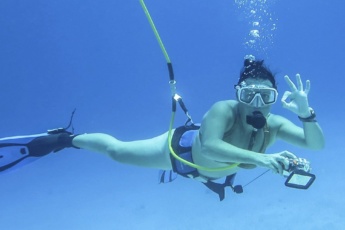
Best Snorkeling & Diving in Punta Cana – Sailing Catamaran Cruise
from $120 View Details -
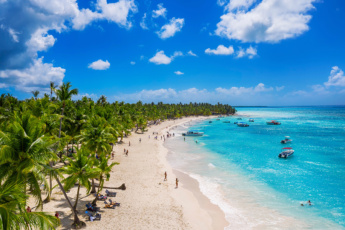
Saona Island Excursion – VIP Paradise
from $1250 View Details -
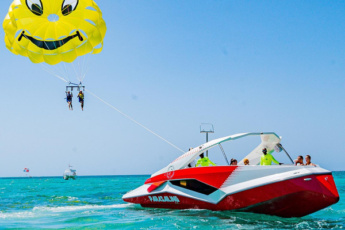
Best Parasailing in Punta Cana, Bávaro – 3-in-1 Combo: Parasailing, Snorkeling, Catamaran Sailing
from $140 View Details -
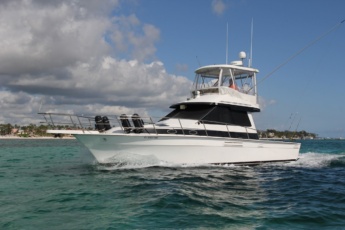
3-Hour Snorkeling Tour on Fortuna 42 Boat – Bavaro, Punta Cana
from $670 View Details
Cultural tours and historical exploration
For those keen on learning more about the Dominican Republic’s rich heritage, a range of cultural tours and historical sites await exploration.
- Colonial Zone of Santo Domingo. As a UNESCO World Heritage site, the Colonial Zone features well-preserved historical landmarks, including the first cathedral of the Americas, Alcázar de Colón, and cobblestone streets lined with cafes and museums.
- Altos de Chavón. A replica 16th-century Mediterranean village overlooking the Chavón River. Visitors can explore artisan workshops, boutiques, and an impressive amphitheater.
-
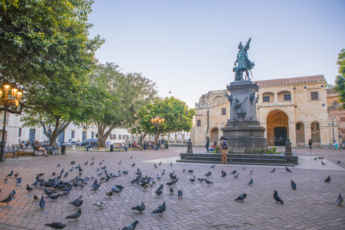
Santo Domingo City Tour – Full-Day Excursion to Colonial Zone & Los Tres Ojos
from $75 View Details -
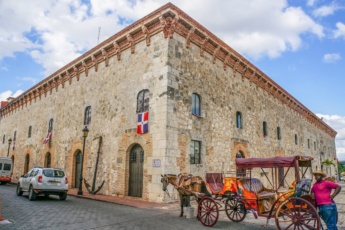
Santo Domingo City Tour 2026 – Safe & Private
from $780 View Details -
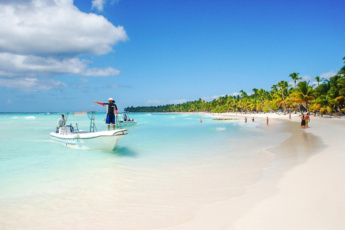
Saona Island and Altos de Chavon 2-in-1 Private Excursion (from Punta Cana)
from $1040 View Details -
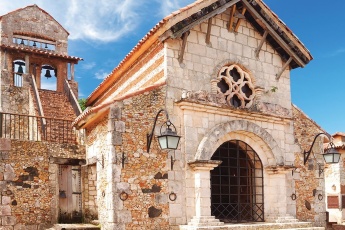
Altos de Chavon VIP Tour The Dominican Republic
from $699 View Details -
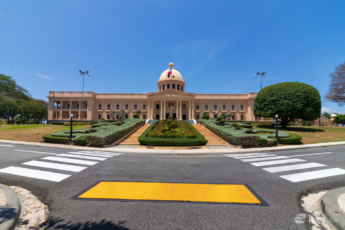
Santo Domingo Tour from Punta Cana – Private Full Day Excursion in the Colonial Zone of Santo Domingo
from $930 View Details -
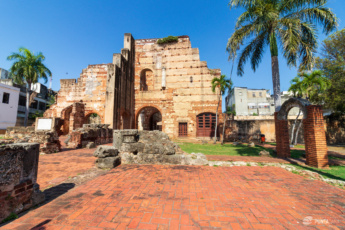
Santo Domingo Full Day VIP Tour from Punta Cana – Zona Colonial, Conquista Park, Los Tres Ojos
from $939 View Details
Scuba diving and snorkeling on the North Coast
The North Coast of the Dominican Republic, particularly around Sosúa and Puerto Plata, offers some of the best diving and snorkeling spots. Highlights include:
- Sosúa Bay is known for its coral reefs and clear waters, ideal for beginners.
- Cayo Arena – a tiny sandbar surrounded by crystal-clear waters and thriving marine life.
- Shipwreck diving is great for exploring underwater wrecks that have become vibrant marine habitats.
-
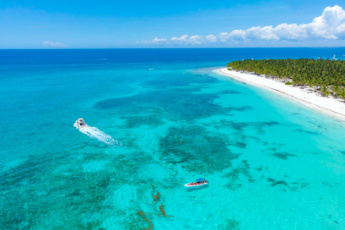
Private Isla Saona VIP Tour – Full-Day, Blue Lagoon, Snorkeling, Mangrove Forests
from $810 View Details -

Power Adventures Full Package – “Bad Girl” Catamaran Cruise with Snorkeling, Hookah Diving, Parasailing & Party
from $160 View Details -

Catalina Island Day Trip: the Best Snorkeling Experience
from $85 View Details -

Best Snorkeling & Diving in Punta Cana – Sailing Catamaran Cruise
from $120 View Details -

The Best Parasailing in Punta Cana, Bávaro – Unique Skydiving Tour 2026
from $85 View Details
January’s calm seas and excellent visibility make it a great time for underwater exploration.
Eco-Tours in Los Haitises National Park
Los Haitises National Park, located in the northeast, is a haven for eco-tourism enthusiasts. This pristine natural reserve features mangrove forests, limestone caves, and an array of endemic bird species. You will visit ancient caves adorned with Taíno petroglyphs and learn about the indigenous people of the Dominican Republic.
Adventure parks and zip-lining
The Dominican Republic is home to a number of adventure parks that offer thrilling activities for visitors of all ages. Best parks for zip-lining:
- Scape Park in Cap Cana offers zip-lining, underground cenote swimming, and off-road adventures.
- Bávaro Adventure Park features zip-lines, bungee trampolines, and even dinosaur-themed attractions.
-
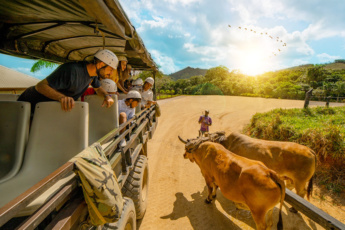
La Hacienda Park – 7-in-1 Adventures Tour in Bávaro, Punta Cana
from $99 View Details -
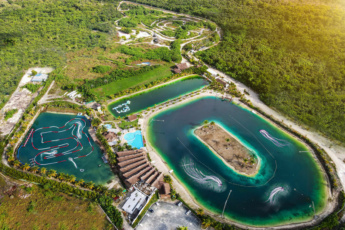
Best 7-in-1 Waterpark Tour in Punta Cana 2026 – Jet Ski, Aqua Karts, Buggy, Party Boat, Zipline
from $209 View Details -
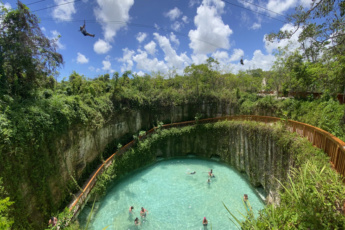
Bávaro Adventure Park Sacred River – Combo Tour with Blue Cenote Lagoon, Jungle River, Dominican Village & Waterfall Pool
from $99 View Details -

Higüey Cultural & Countryside Private Tour – Basilica of Altagracia, Anamuya River, Macao Beach, Horse Ride & Taino Cave
from $120 View Details -
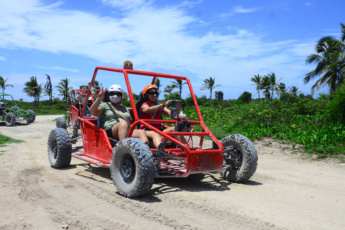
Catamaran & Buggy Ride Tour + Extra Activity of Your Choice – Bávaro Adventure Park Triple Combo
from $179 View Details -

Bávaro Adventure Park Best Combo Tour 2026 – Catamaran, Polaris, Blue Lagoon, Dominican Village & Bonus Activity
from $209 View Details -
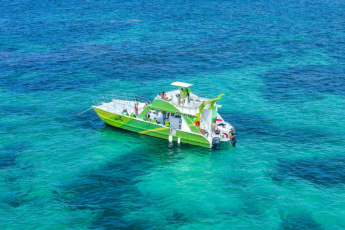
New Catamaran Combo Tour at Bávaro Adventure Park – With 2 Chosen Activities (Zip Line, Horseback Ride, or Sacred River)
from $179 View Details -
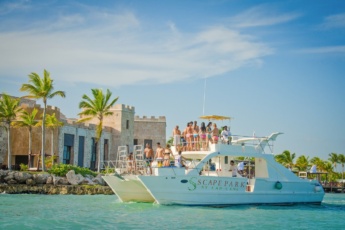
Scape Park in Punta Cana – Full Admission + Sunshine Cruise
from $179 View Details -
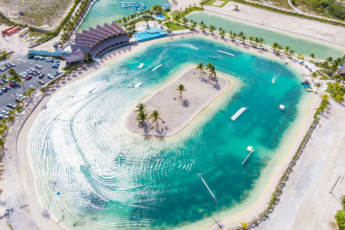
Punta Cana Water Park Half Day Tour – Choose 1 to 3 Main Activities: Jet Ski, Aqua Karts, Buggy & More!
from $99 View Details -
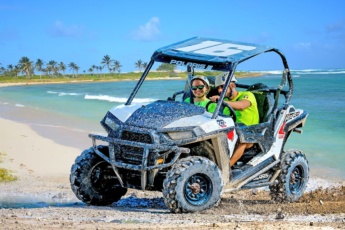
Top Off-Road Polaris VIP Ride Tour at Bávaro Adventure Park, Punta Cana
from $149 View Details -
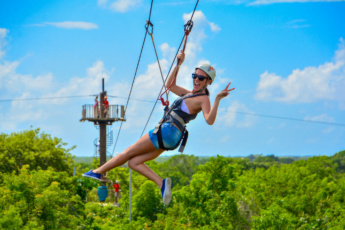
Best Zip Line in Punta Cana 2026 – Bávaro Adventure Park
from $99 View Details -
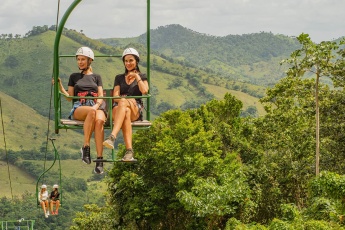
La Hacienda Park – Punta Cana
from $99 View Details -

Best Monkey Excursion from Punta Cana – 2-in-1 Tour: Monkeyland and the Longest Zip Line in the DR
from $130 View Details -

Katmandu Park – Punta Cana’s First Immersive Theme Park
from $85 View Details -
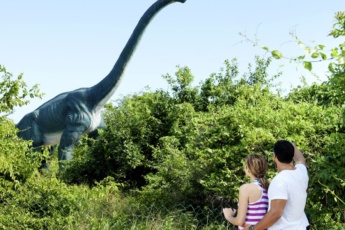
Dino World at Bávaro Adventure Park
from $59 View Details -
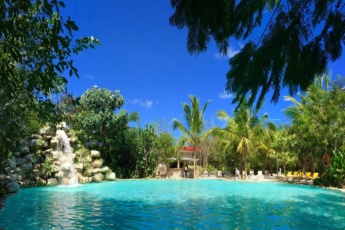
Adventure Plus at Bávaro Adventure Park, Punta Cana
from $139 View Details -

Adventure Activities at Bávaro Adventure Park, Punta Cana
from $109 View Details
These parks combine adventure and leisure, making them ideal for groups with children and teenagers.
Beach relaxation and wellness retreats
No trip to the Dominican Republic is complete without downtime on its stunning beaches. January’s perfect weather makes it an excellent time to enjoy sunbathing, beach yoga, and wellness retreats. The best beaches to visit are:
- Bávaro Beach (Punta Cana): Known for its powdery sand and gentle waves.
- Las Terrenas (Samaná Peninsula): Offers a laid-back vibe and quieter stretches of beach.
-
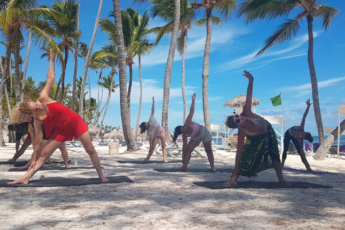
Yoga Center in Punta Cana (Bávaro) – Meditations, Massages, Wellness Events
from $49 View Details -
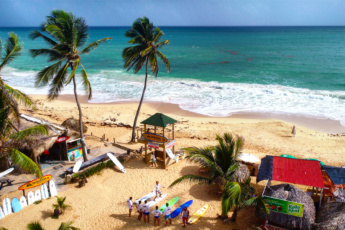
VIP Surfing in Punta Cana – «Surfing in Paradise», Uvero Alto Beach
from $139 View Details -
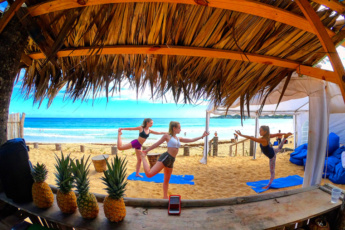
Excursion to Surfing School in Punta Cana – «Chill Out in Paradise»
from $45 View Details -

Traditional Chinese Treatments – Spa & Wellness in Punta Cana
from $105 View Details -

Organic Summer Package – Spa & Wellness in Punta Cana
from $150 View Details -

Super Lady SPA Package – Spa & Wellness Center in Punta Cana
from $250 View Details
Whether you’re a thrill-seeker or someone who prefers a more laid-back vacation, the Dominican Republic in January has something for everyone. From cultural excursions and eco-adventures to beach bliss and wellness retreats, there are endless ways to make your trip unforgettable.
Cost of Traveling to the Dominican Republic
in January
Traveling to the DR in January, particularly to popular destinations like Punta Cana, can be a fantastic way to escape winter’s chill while enjoying a sun-drenched tropical paradise. However, January is part of the peak season, so prices may be higher than in the off-season. Here’s a detailed breakdown of what you can expect to spend during a typical week-long vacation for 2 people in Punta Cana, covering key aspects such as flights, accommodations, food, excursions, and more.
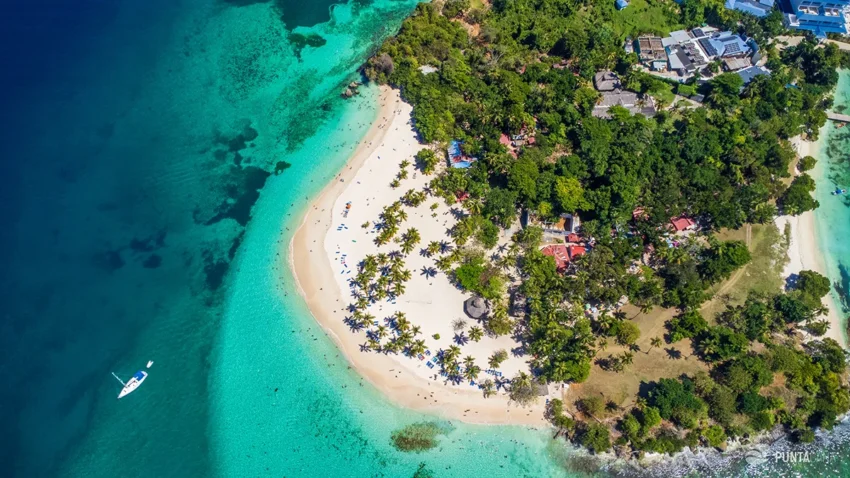
Samana Island drone view, the Dominican Republic
Flight tickets booking
Flights to Punta Cana can vary significantly based on your departure location, booking time, and airline preferences.
- The approximate cost of round-trip flights for two people from North America or Europe to Punta Cana in January can range from $800 to $2,000, depending on how far in advance you book and the class you choose (economy or business).
Booking tips:
- Early booking. January is busy, so booking your tickets 3-6 months in advance is ideal for securing the best rates.
- Flexible dates. Flying mid-week or choosing less popular travel days can reduce airfare costs.
- Flight comparators. Use platforms like Skyscanner or Google Flights to track fares and find deals.
Accommodation costs
Accommodation in Punta Cana offers a wide range of options, from budget hotels and Airbnb rentals to luxurious all-inclusive resorts. Here’s a breakdown:
Accommodation costs in Punta Cana in January
| Type | Info | Average cost (7 nights) |
|---|---|---|
| Budget hotels / Airbnb | Basic amenities, often not beachfront. Ideal for budget travelers. | $300 – $600 |
| Mid-range resorts | Comfortable accommodations, typically including pools, spas, and some meals. | $800 – $1,500 |
| All-inclusive resorts | Includes meals, drinks, and various activities. Best for convenience and luxury. | $2,000 – $4,500 |
| Luxury villas | High-end private villas often with pools, beach access, and personalized services. | $5,000 – $10,000+ |
Consider all-inclusive resorts if you prefer a stress-free vacation, as it simplifies budgeting for meals and entertainment. But if you’re traveling with another couple or family, renting a villa can sometimes offer better value per person.
-

Luxury All Inclusive Villa Waterfall in Punta Cana (Bávaro, Cocotal) – Private Pool, BBQ, Maid, Chef & Meal Plans
from $1320 / night View Details -

Villa Désirée – Luxury Golf Villa in Punta Cana’s Prestigious Cocotal Golf & Country Club – Huge Private Pool & BBQ Area, Kids’ Playground
from $1099 / night View Details -

Villa May – New Modern Beachfront 7BR Villa with Pool & Maid in Bavaro, Los Corales
from $1299 / night View Details -

Spacious 4-BR Punta Cana Golf Villa in Cocotal – Private Pool, Jacuzzi & Basketball Hoop for Family Fun
from $649 / night View Details -

Villa Agapi (Caleton Estates 57) – The Most Beautiful Ocean View Villa in Cap Cana
from $2850 / night View Details -

Exclusive Ocean View 5-Star Cap Cana Villa for Rent – Chef, Butler, Maid & Golf Cart
from $4600 / night View Details
Food and dining expenses
The cost of food can vary depending on whether you eat at local eateries or upscale restaurants. If you’re staying in an all-inclusive resort, food and drink are already covered. For those dining out for local restaurants (for 2 persons):
- Breakfast – $10 – $20
- Lunch – $20 – $40
- Dinner – $30 – $60 (including drinks)
Total estimated cost for 7 days – $420 – $840.
Advice! Eating at local spots or “comedor” restaurants often provides a more authentic and affordable experience. If you have kitchen access, buying groceries for some meals can save costs.
Transportation costs in Punta Cana
Navigating Punta Cana and its surrounding areas may involve various transportation options:
Airport transfers (from PUJ Airport):
- Shuttle or taxi service from the airport to the resorts generally costs $30 – $70.
-
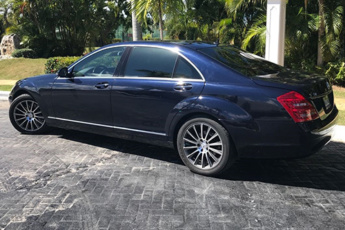
Mercedes s350 VIP Transfer in Punta Cana
from $126 View Details -
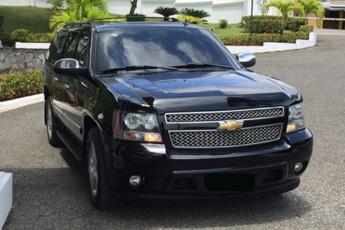
Chevrolet Suburban – VIP Transfer
from $97 View Details -
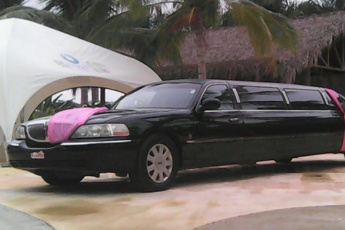
Limo – VIP Transfer
from $134 View Details -
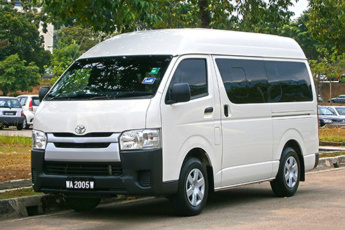
Passenger Car or Minibus Up to 4 People
from $42 View Details -

SUV or a Minivan (up to 6 People)
from $52 View Details -

Minibus Transportation Up To 8 People
from $62 View Details
- Rental car. Daily rates range from $40 – $80, plus fuel costs.
-
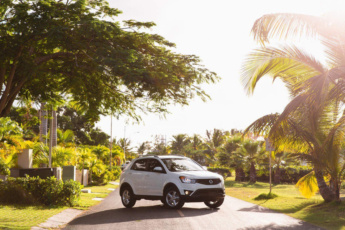
SsangYong Tivoli Hire a car in Punta Cana
from $85 View Details -
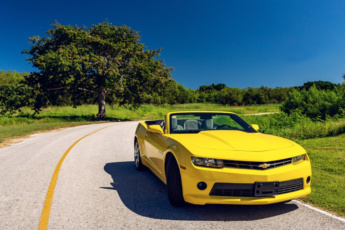
Chevrolet Camaro Convertible Luxury car rental in Punta Cana
from $120 View Details -
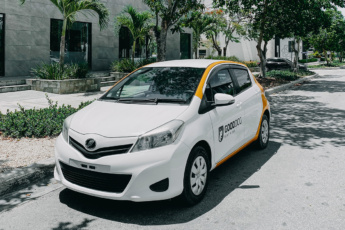
Toyota Vitz Rent a car in Punt Cana
from $59 View Details -
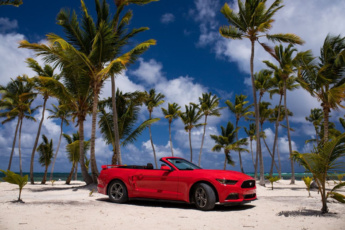
Ford Mustang Convertible Car Rentals in Punta Cana
from $180 View Details -

Kia Optima Cheap car rentals in Punta Cana
from $75 View Details
Local transportation:
- Taxis within Punta Cana generally cost $10 – $30 per trip, depending on distance.
- Public transport (guagua) is more affordable but less convenient and not always reliable for tourists.
Excursions and activities in Punta Cana
The Dominican Republic offers a plethora of activities, including water sports, nature tours, and cultural excursions. Here are some average prices for popular activities in January:
- Whale-watching tour (Samana): $100 – $150 per person (seasonal)
- Catamaran or snorkeling trip: $70 – $120 per person
- Excursion to Saona Island: $80 – $150 per person
- Zip-lining adventure: $60 – $100 per person
- Scuba diving or surfing lessons: $100 – $200 per person (varies with location and duration)
-

The Best Samaná Whale Watching Tour 2026 – Humpback Whales, Cayo Levantado, El Limon Waterfall
from $149 View Details -
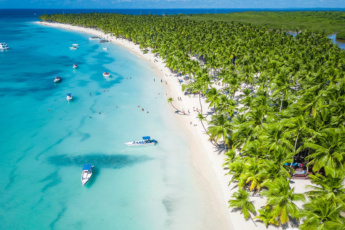
Saona Island Excursion – Caribbean Paradise
from $75 View Details -

La Hacienda Park – 7-in-1 Adventures Tour in Bávaro, Punta Cana
from $99 View Details -

Best 7-in-1 Waterpark Tour in Punta Cana 2026 – Jet Ski, Aqua Karts, Buggy, Party Boat, Zipline
from $209 View Details -

Private Isla Saona VIP Tour – Full-Day, Blue Lagoon, Snorkeling, Mangrove Forests
from $810 View Details -

Bávaro Adventure Park Best Combo Tour 2026 – Catamaran, Polaris, Blue Lagoon, Dominican Village & Bonus Activity
from $209 View Details -
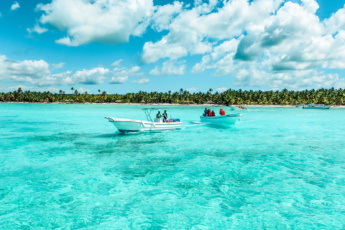
Isla Saona Boat Tour – Toro and Palmilla Beach & Natural Pool
from $149 View Details -

VIP Surfing in Punta Cana – «Surfing in Paradise», Uvero Alto Beach
from $139 View Details -

Best Snorkeling & Diving in Punta Cana – Sailing Catamaran Cruise
from $120 View Details -

Best Parasailing in Punta Cana, Bávaro – 3-in-1 Combo: Parasailing, Snorkeling, Catamaran Sailing
from $140 View Details -

Best Zip Line in Punta Cana 2026 – Bávaro Adventure Park
from $99 View Details -

La Hacienda Park – Punta Cana
from $99 View Details -

Saona Island and Altos de Chavon 2-in-1 Private Excursion (from Punta Cana)
from $1040 View Details -

Private Whale Watching Tour from Punta Cana – Samaná Humpback Whales, Bacardi Island, El Limon Waterfall
from $2400 View Details -

Private Samana Whale Watching Tour from Punta Cana – Humpback Whales & Cayo Levantado
from $2140 View Details -
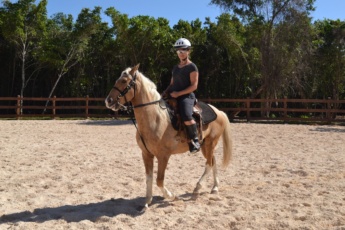
Countryside Horseback Riding at Scape Park in Cap Cana
from $89 View Details -
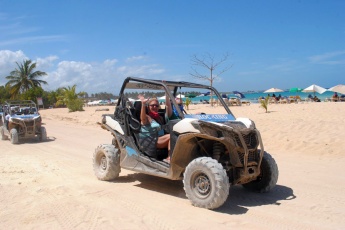
CAN-AM Maverick Hard Rock Off-Rider Adventure in Punta Cana
from $150 View Details
Booking package deals through your hotel or a reputable tour operator may offer better value. Consider group tours to reduce per-person costs.
Entertainment and nightlife costs
For those looking to enjoy nightlife and entertainment, Punta Cana boasts beach clubs, casinos, and live shows:
- Nightclub entry fee – $10 – $40 (drinks not included)
- Beach bars and clubs – cocktails range from $6 – $15.
- Live entertainment (dinner shows, etc.) – $40 – $100 per ticket.
-

Coco Bongo Show & Disco Punta Cana – Night Club Party 2026 (No Dress Code!)
from $75 View Details -
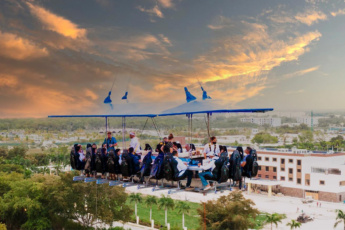
Dinner In the Sky in Punta Cana – Top Chef Dishes 150 Feet Above the Ground (Menu, Prices, Reservation)
from $168 View Details -
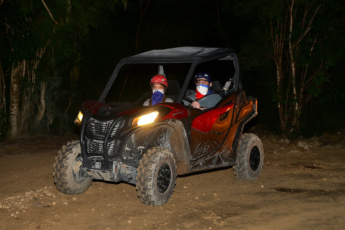
Night ATV Polaris Riding in Punta Cana + Jungle Party, Turf Dinner, and Open Bar at Bávaro Adventure Park
from $169 View Details -
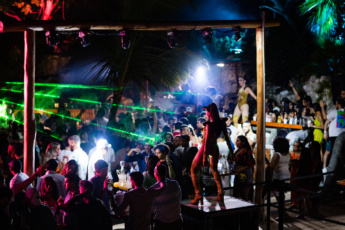
Punta Cana Night Club with Best Prices – Maroca Club VIP Entry (Open Bar)
from $75 View Details -
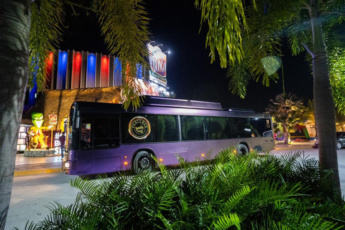
Party Bus Punta Cana Night Tour – Enjoy the vibrant nightlife of the Dominican Republic
from $129 View Details -
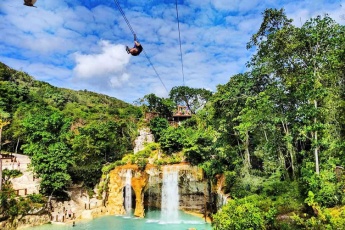
Night Adventure at Scape Park Punta Cana – Water Fun, Dinner, and Music Entertainment by the Waterfall
from $139 View Details
Total estimated budget for Punta Cana
For a 7-night vacation in January for two people in Punta Cana, here’s a general cost range, including all major expenses:
Approx. expenses in Punta Cana for 7 days for 2
| Expense category | Cost range |
|---|---|
| Flights | $800 – $2,000 |
| Accommodation | $800 – $4,500 |
| Food and dining | $420 – $840 |
| Transportation | $150 – $490 |
| Excursions / activities | $200 – $600 |
| Entertainment | $100 – $400 |
| Total estimated cost | $2,470 – $8,830 |
A January trip to the Dominican Republic, particularly to destinations like Punta Cana, offers luxury and affordability, depending on your choices. While peak season prices may be higher, early bookings, flexible travel dates, and careful budgeting can make for a memorable and cost-effective vacation. By understanding typical flights, accommodations, dining, and activities expenses, travelers can better plan and enjoy a tropical escape, maximizing their experience while staying within budget.
To sum up all the above
In summary, the Dominican Republic presents a perfect winter escape in January with its warm weather, stunning beaches, and vibrant culture. Travelers can enjoy comfortable temperatures ideal for swimming, outdoor activities, and relaxation in a tropical paradise. With a range of accommodation options, from luxury villas to budget-friendly resorts, there is something for every traveler.
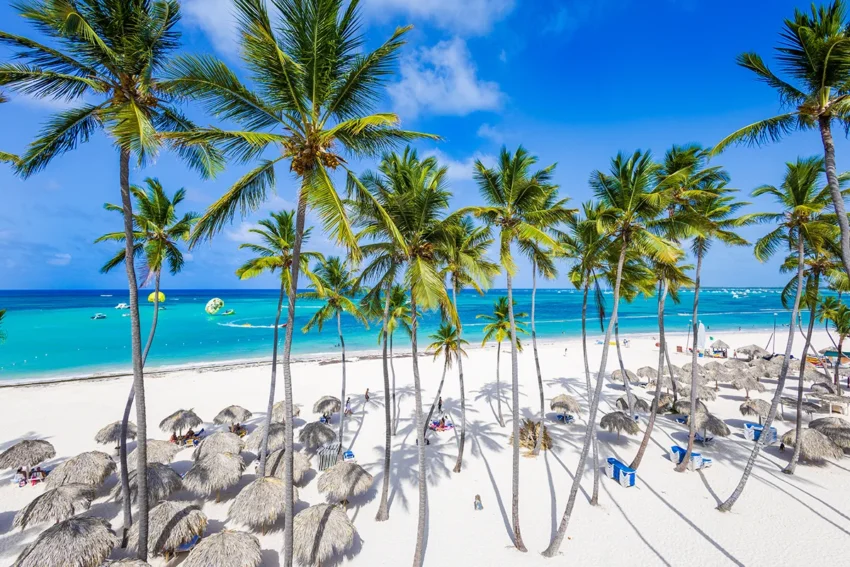
Bavaro Beach, Punta Cana
January’s dry season makes it a prime time for excursions, offering unique opportunities like whale-watching in Samaná or exploring the lush mountains of Jarabacoa. Although it is peak travel season, planning and budgeting wisely ensures a rewarding experience. Visitors can fully embrace the country’s charm by taking note of essential travel tips, making their vacation in the Dominican Republic unforgettable.
Frequently asked questions about the
Dominican Republic in January
Is January a good time to go to the Dominican Republic?
Yes, January is a flawless time to visit the Dominican Republic. It marks the peak of the dry season, offering sunny skies, warm temperatures, and lower humidity compared to the summer months. January’s pleasant climate makes it ideal for beachgoers, nature enthusiasts, and those looking to escape colder climates elsewhere.
Average temperatures typically range from 25°C to 28°C during the day, with cooler evenings that hover around 19-22°C. Popular tourist destinations like Punta Cana, Puerto Plata, and La Romana see consistent sunshine and minimal rain, making outdoor activities and excursions, beach days highly enjoyable.
Key moments in January:
- January is the start of the humpback whale-watching season in Samaná Bay, a truly spectacular sight.
- Travelers can enjoy the Feast of the Epiphany, a religious and cultural celebration with parades and music.
Can you swim in Dominican Republic in January?
Of course! The Dominican Republic’s ocean temperatures remain inviting year-round, and January is no exception. The average sea temperature ranges from 26°C to 27°C, offering a comfortable swimming experience whether you’re splashing in Punta Cana’s turquoise waters or exploring the secluded beaches of Samaná.
In addition to swimming, water activities like snorkeling, scuba diving, and kite surfing are popular and enjoyable during this month due to calm seas and good underwater visibility. Whether you’re relaxing by the beach or engaging in water sports, January offers great conditions.
How hot is the Dominican Republic in January?
In January, temperatures in the Dominican Republic are warm but generally not oppressively hot. Daytime temperatures typically range between 25°C and 28°C (77°F to 82°F). Here’s a breakdown of average temperatures across key regions:
Weather conditions in January in the Dominican Republic
| Region | Average high (°C/°F) | Average low (°C/°F) |
|---|---|---|
| Punta Cana | 28°C / 82°F | 22°C / 72°F |
| Santo Domingo | 29°C / 84°F | 20°C / 68°F |
| Puerto Plata | 27°C / 81°F | 19°C / 66°F |
| Samaná | 27°C / 81°F | 21°C / 70°F |
Evenings can feel relatively cooler, especially in mountainous regions like Jarabacoa, where temperatures may dip further. Travelers often find this balance of warmth during the day and mild coolness at night refreshing.
Is January a good time to go to the DR?
Yes, January is one of the best months to visit the Dominican Republic. The weather is consistently warm and sunny with minimal rainfall, making it ideal for exploring beaches, historical sites, and national parks. January belongs to the high tourist season, which means destinations like Punta Cana and La Romana are bustling with activity, providing energetic nightlife, social gatherings, and an array of excursions to enjoy.
From a practical perspective, traveling in January ensures you’re experiencing the Dominican Republic at its most picturesque—perfect for memorable beach days, sightseeing tours, and outdoor adventures. If you prefer fewer crowds, consider visiting less touristy areas like the north coast or inland regions for a more relaxed experience.
What is the cheapest month to go to the Dominican Republic?
The cheapest months to visit the Dominican Republic are typically September and October. These months fall within the hurricane season, resulting in lower prices for flights, accommodation, and excursions. However, you should be prepared for the possibility of rain and storms.
If you prefer avoiding the hurricane season while still looking for budget-friendly travel, early December or late April through early May can also be less expensive times to visit. In comparison, January tends to be more expensive due to its popularity and peak tourist demand.
Is Punta Cana crowded in January?
Yes, Punta Cana tends to be relatively crowded in January. As one of the Dominican Republic’s most popular tourist destinations, Punta Cana draws numerous visitors seeking warm weather during winter. The area’s beaches, luxury resorts, and wide range of activities attract tourists from North America and Europe, resulting in a lively and bustling atmosphere.
To maximize your experience while avoiding large crowds:
- Book tours and excursions early. Popular activities like catamaran cruises and zip-lining fill up quickly.
- Think of visiting quieter beaches. Head to less-traveled spots like Playa Macao or explore Cap Cana for a more tranquil experience.
- Visit midweek. Beaches and attractions may be slightly less busy compared to weekends.
Despite the crowds, January’s festive vibe, combined with fantastic weather, makes it worth the visit.
When not to go to Dominican Republic, Punta Cana?
While the Dominican Republic and Punta Cana are year-round destinations, there are certain times you may want to avoid visiting, depending on your preferences:
- Hurricane season (August to October). This period poses the greatest risk of tropical storms and hurricanes. While direct hits are rare, heavy rain and rough seas can disrupt travel plans. It’s worth noting that September is historically the peak month for hurricanes. If you choose to travel during this time, consider travel insurance.
- Peak holiday crowds (Late December to Early January). The period from Christmas through New Year sees a significant spike in tourist numbers and prices. Hotels, flights, and attractions are often fully booked, and costs can be steep. If you prefer a quieter experience and more affordable rates, it’s best to avoid this period.
- Easter week (Semana Santa). Holy Week, typically in late March or early April, sees an influx of local and international tourists. Beaches, roads, and hotels can be crowded, and some tourist attractions may close for religious observance.
What are the best and worst months to visit Punta Cana?
Best months:
- December to April period offers the best weather, with warm temperatures, sunny skies, and low humidity. It’s also the dry season, making it ideal for beachgoers and outdoor activities.
Worst months:
- August to October are hurricane seasons, and the months are often characterized by higher humidity, rainfall, and potential storms. Although prices for accommodation and flights tend to be lower, travelers should be prepared for variable weather conditions.
What is the coldest month in Dominican Republic?
The coldest month in the Dominican Republic is typically January. Even so, the “cold” is relative, as temperatures remain quite warm compared to many other places. Daytime temperatures generally range from 25°C to 28°C, with cooler nights averaging 18°C to 22°C.
In mountainous regions like Constanza or Jarabacoa, temperatures can dip lower, with occasional cool evenings dropping below 10°C.
What month is hurricane season in Dominican Republic?
The hurricane season in the Dominican Republic runs from June 1st to November 30th, with the highest likelihood of hurricanes occurring between August and October. September is often considered the peak month for tropical storms and hurricanes.
Travelers should monitor weather forecasts closely and may want to consider travel insurance when planning a trip during this period. While the risk of a direct hit by a hurricane is relatively low, rain, strong winds, and rough seas can still affect travel plans.
Is the Dominican Republic expensive?
The cost of visiting the Dominican Republic can vary widely depending on travel style and preferences. In general, the country offers a broad range of budget options, from affordable guesthouses and local dining spots to luxury resorts and fine-dining establishments.
- Accommodation. Budget travelers can find hotels or guesthouses starting at around $30–$50 per night, while high-end resorts and all-inclusive packages can range from $150–$500+ per night.
- Dining. Local restaurants (fondas) serve meals for $5–$10, while dining at high-end or tourist-oriented spots can cost $20–$50 per meal.
- Activities. Excursions such as catamaran tours, zip-lining, and day trips vary but typically range from $40–$150 per person.
Overall, travelers seeking luxury and all-inclusive experiences may find the Dominican Republic relatively expensive, but budget-conscious travelers can still enjoy a fulfilling visit without breaking the bank.
What is the best month to visit the Dominican Republic?
The best months to visit the Dominican Republic are typically December to April, during the dry season. This period features warm temperatures, plenty of sunshine, and lower humidity, creating ideal conditions for beach activities, excursions, and sightseeing.
Highlights during this period include:
- Whale watching in Samaná Bay from mid-January to March.
- Easter Week (Semana Santa) in March/April, offering vibrant local festivities (though it can be crowded).
May and November can also be attractive months to visit for those looking for fewer crowds, good weather, and slightly lower rates, just outside the peak season.
What season is it in the Dominican Republic in January?
In January, the Dominican Republic is experiencing its dry season, also called the “winter season” by locals. This is considered one of the best times to visit, thanks to its pleasant climate, warm temperatures, low humidity, and minimal rainfall. Despite being winter by Northern Hemisphere standards, the Dominican Republic maintains tropical warmth, with daytime temperatures ranging from 25°C to 28°C.
What are the rainiest months in the Dominican Republic?
The rainiest months in the Dominican Republic typically fall between May and October. This period, which coincides with the region’s wet/hurricane season, experiences higher humidity, frequent afternoon showers, and the potential for tropical storms. May, August, and September are often particularly rainy months, with the north coast experiencing the heaviest rains during this time.
That said, rainfall is usually brief, with showers often clearing up quickly, allowing for sunny skies to return. In coastal areas like Punta Cana, the rainy season may bring less rainfall compared to northern regions like Puerto Plata or Samaná.
Is it safe to travel to the Dominican Republic?
Yes, it is generally safe to travel to the Dominican Republic. The country is one of the Caribbean’s most popular tourist destinations, attracting millions of visitors each year. However, as with any travel destination, it’s wise to exercise common sense and take precautions to ensure a safe and enjoyable trip:
Safety tips:
- Avoid flashing valuables and keep an eye on personal belongings, especially in crowded tourist areas.
- Use licensed taxis or transportation services for travel within cities and towns.
- Stay in reputable accommodations and use the hotel safe to store passports and valuables.
- Be cautious at night, particularly in unfamiliar areas, and stick to well-lit and busy locations.
- Be mindful of water safety. Swim only in designated areas and be aware of rip currents, especially on less-populated beaches.
While petty crime can occur, violent crime against tourists is relatively rare. The government places significant emphasis on tourist security, particularly in popular areas like Punta Cana, Puerto Plata, and Santo Domingo. When exploring less-touristy areas or remote regions, checking the latest travel advisories is good practice.
Updated on: . Author:

